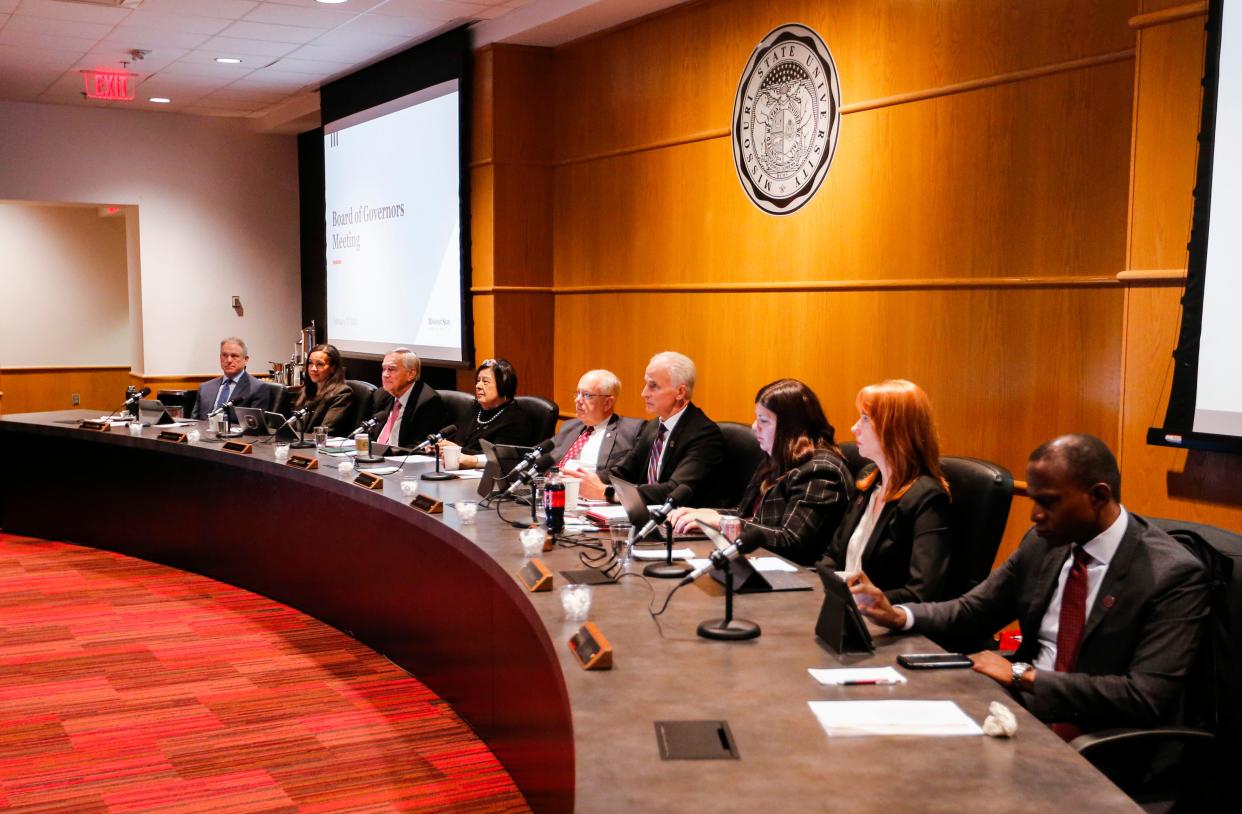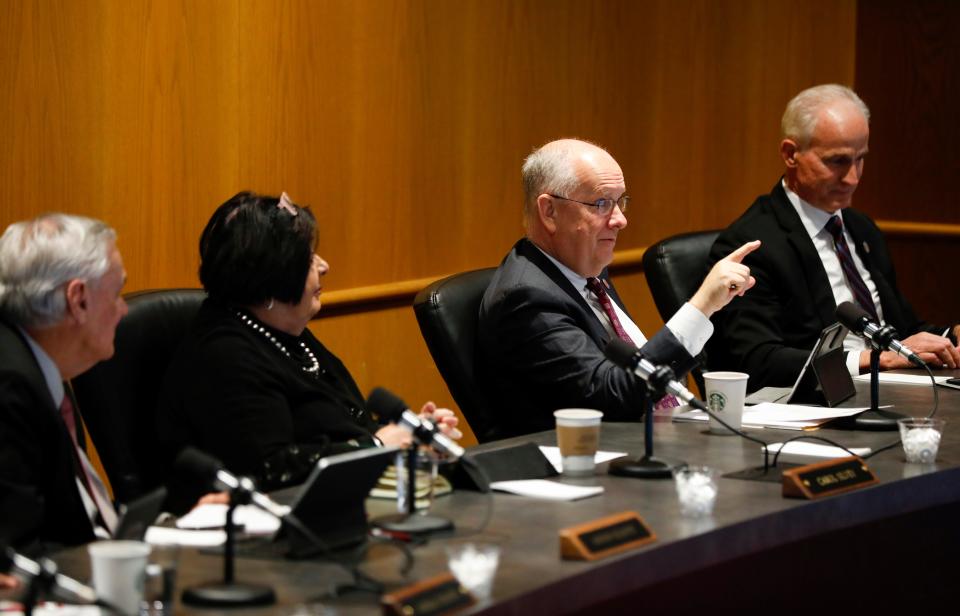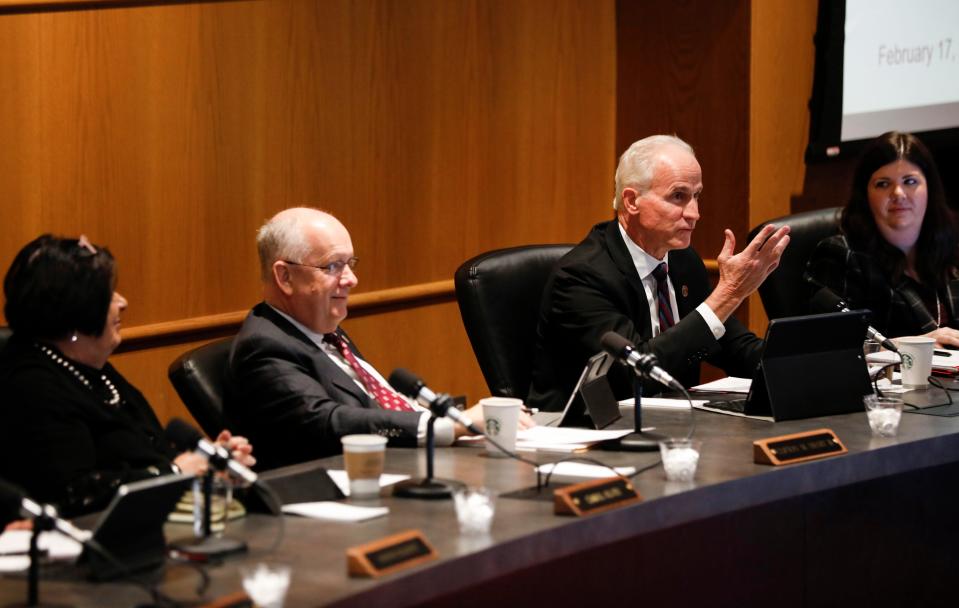MSU raises tuition while seeking to maintain 'affordability edge' against competitors

Tuition and fees are on the rise at Missouri State but university officials said they took deliberate steps to keep the "affordability edge" they said is critical to recruiting and keeping students.
MSU President Clif Smart said the university has identified $5 million in spending cuts to help offset a second year of high inflation.
He said the cost of attending Missouri State will go up next year — a total of 4.9% for a typical student — but the percentage it will go up is in the ballpark of increases approved at most regional, four-year public institutions in Missouri.
At MSU, an in-state undergraduate who takes 30 credit hours during the 2023-24 year will pay an average of $9,582 in tuition and fees.
The amount reflects a 4.5% tuition increase approved Wednesday by the executive committee of the MSU Board of Governors. It increases the in-state undergraduate tuition rate to $279 a credit hour, which is $12 higher than during this school year.
"We are under inflation significantly for the second year in a row as we work to maintain our advantage in affordability compared to the University of Missouri schools and the other big schools in Kansas, Arkansas, Illinois that surround us," Smart said.
"If you look at the decisions that the regional schools have made in terms of tuition increases, they go from 4.2% to 4.9%. We are all in essentially the same range, all below inflation and our place (in cost rankings) does not change."
More: Retention deal keeps fundraising leader Brent Dunn at Missouri State another 5 years

If enrollment remains flat this fall, the MSU tuition increase is expected to generate an additional $5 million and the university is also expecting an increase in state funding based on the governor's recommendation and discussions in the Missouri General Assembly.
Smart noted MSU increased tuition by 3.9% last year, the highest jump in at least 10 years, when inflation was 7%. This year, inflation is 6.5% and the tuition will go up 4.5% next year.
He noted the size of the MSU increase is comparable to what many public four-year higher education institutions in the state have approved — or are considering this month — with one glaring exception: The University of Missouri system.
"They are going to a new pricing structure this fall," he said. "They are going to what is called a differential pricing structure. They are putting all programs in tiers."
That system has moved to a new tier-based tuition structure for undergraduate students that eliminates course fees. In the tier-based system, the annual cost of tuition and fees is based on a student's degree plan.
For example, a University of Missouri-Columbia student pursing a teaching degree falls into Tier I, the lowest, and will pay $14,122 a year. Majors listed in Tier II, including animal sciences, are $15,922 a year. A student majoring in electrical engineering falls into Tier III and will pay $17,722 a year.
The tiered rates are similar for the Missouri University of Science & Technology − $13,000 for Tier I, $15,000 for Tier II and $17,000 for Tier III.
The rates were not yet available for the University of Missouri campuses in Kansas City and St. Louis.

Smart said the University of Missouri's pricing structure may give Missouri State, which still charges course-specific fees, an advantage for students only looking at large public universities within a short drive.
"If you want to go to a big school and you're from our area, you are picking between us, Mizzou and Arkansas, more times than not," he said
Missouri's public colleges and universities typically finalize tuition and fees in April, as state funding levels take shape and budget plans are formulated for the following year.
In addition to the ones listed above, at least five other Missouri public four-year institutions have announced what they will charge in tuition and fees to a typical full-time undergraduate.
Here is a look at that annual amount and how the cost compares to the current year:
Lincoln University — $8,737, increase of 4.2%
Truman State University — $9,115, increase of 4.9%
Southeast Missouri State University — $9,403, increase of 4.3%
Missouri State University — $9,582, increase of 4.9%
University of Central Missouri — $9,641, increase of 3%
Northwest Missouri State University — $12,269, increase of 3.3%
Final decisions from Harris-Stowe State University, Missouri Southern State University and Missouri Western State University were not known at the start of this week.

Smart said the strategy behind the tuition and fee increase at Missouri State was two-fold. The university needed to offset higher costs and figure out a way to raise pay levels for faculty and staff.
"It is really walking that line, how do we compensate our employees and make sure we have good people here to deliver a good product versus how do we work to keep college affordable," he said.
More: 'Totally accessible' MSU pedestrian underpass set to mid-May, one year later than planned
A year ago, the university approved a 4% across-the-board pay raise for employees. This year, the goal is 5%, as well as targeted increases in specific areas.
The executive committee of the MSU Board of Governors will meet twice before the full meeting in May, by which a final decision is expected.
"We are working to do a more significant compensation increase than we did last year," Smart said. "We have to do a real compensation increase for our people or they fall further and further behind and we lose the good ones."
Claudette Riley covers education for the News-Leader. Email tips and story ideas to criley@news-leader.com.
This article originally appeared on Springfield News-Leader: MSU raises tuition to offset high inflation, offer better staff pay

